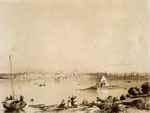History of Tatarstan and Tatar people
The centuries-old history of Tatarstan and Tatar people, as well as destiny of all Russia, is tragic.
Any history is full of falsities, mirages and biases, but there are only few peoples in the world who got so much of historical misunderstanding and annalistic mirages as Tatar people.

The name "tata", "Tatars" came in the beginning of Middle Ages from far China where this name referred to one of the Mongolian tribes. Truth this or not, these "tata" were in avant guarde of inducing horror victorious tumens of great conqueror Chingiskhan, but after the capture of the Muslim world - "all merged in the state of Golden Horde peoples began to be referred to as Tatars". Russian historian N.I.Vorobiev wrote: "Name of Tatars (official Russian name of the population of Golden Horde) referred to the population of Volga-Kama region began to be applied by Russians only from the moment when after the organization of Kazan Khanate and brilliant victories of it over Russians, all former relations which were produced by Russians in relation to Golden Horde, were transferred onto Kazan Khanate and its population. Finnish tribes living there named them not Tatars, but still "Bolgars". Tatars never used this name, on the contrary, Kazan Tatars considered this name an insulting nickname".
Kazan Tatars always protected in memory their true historical self-name - "Volga Bulgars".
In 550 B.C. the gothic historian Iordan wrote about Turkic tribes of Bolgars, living in the Northern Black sea region. The state of the Bolgars was strong, resisted in wars with Byzantium, but fell under the pressure of Khazars, and from descendants of them wandering over Europe came were peoples of Danube Bolgars, Volga silver Bulgars, and the Caucasian tribes of Balkars, Kumyks and Karachaevtsy. Founders of modern Bulgaria, today's Tatarstan and Chuvashia were in V-VII centuries the same people, but Danube Bolgars, having accepted christianity, soon lost the Turkic originality, having kept nevertheless the ancient name of the country; as for Kazan Tatars, have kept everything, except for the name. Such are paradoxes of history. About the state of Volga silver Bulgars, formed in VII-IX centuries, many historians knew. Even the great historian and thinker Rodger Becon in the great composition, Opus Magnum, written in in the second half of XIII century, wrote: "Great Bulgaria, whence occur Bulgars, living between Constantinople, Hungary and Sklavonia. That one located in Europe, - Small Bulgaria, and they speak the language of Bulgars, living in Great Bulgaria which is in Asia."
Great Bulgaria of early Middle Ages which successors became Kazan Khanate and modern Tatarstan, was the mighty developed state, trading with all known world: Bulgar leather products and furs were not only in the countries of the East, but also in Lithuania, Poland, Italy, Flanders. Speaking about the educated civilization of Volga Bulgars and naming them "trading industrial people", the Russian historian Soloviev wrote: "Long since when the Russian slav did not begin to build on Oka christian churches, did not occupy some more places in the name of the European civilization, Bolgar listened already to the Koran on the coast of Volga and Kama". Volga Bulgars since X century minted silver coins with Arabian inscriptions, that clearly speaks about the level of development of trade, including external.
So people lived, worked, created material and spiritual values. Up to now from those far times monuments of architecture, applied art, literary works have been preserved.
From times of Ivan the Terrible, the history of Tatar people is inextricably related with the destiny of the Russian state. |


